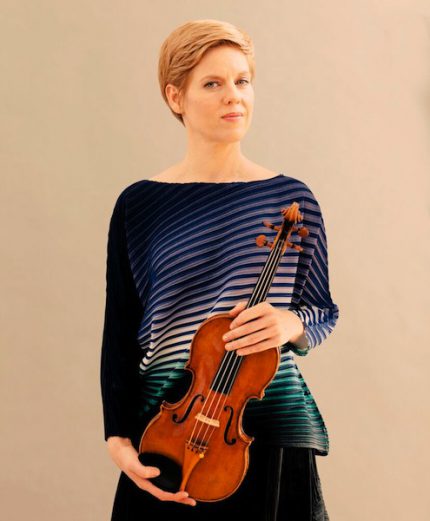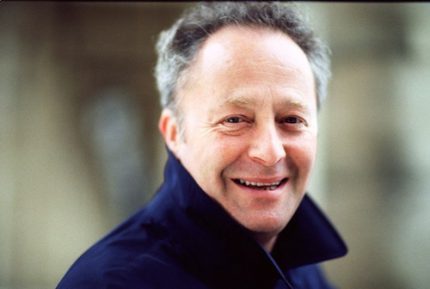A belated Schumann premiere and a Saint-Saëns spectacular from Krivine, CSO

Emmanuel Krivine was back on the podium for his second week this season with the Chicago Symphony Orchestra. Friday night’s program proved something of a mixed bag, offering an uneven first half followed by a symphonic spectacular after intermission.
The evening led off with Brahms’ Tragic Overture. A perennial of the Solti era, this staple, amazingly, has not been performed by the orchestra downtown in 26 years.
Krivine’s penchant for fast tempos didn’t do Brahms’ music any favors. The French conductor’s garrulous rush through the score was unconvincing, diluting the dark, dramatic weight at its core, and losing the essential contrast of the consolatory second theme.
Robert Schumann’s Violin Concerto was the evening’s centerpiece performed by Isabelle Faust, and heard in its belated Orchestra Hall debut. (The work’s only previous CSO appearance was with Christian Tetzlaff in 1996 at Ravinia under Christoph Eschenbach.)
Few works by great composers have had as unpromising a history as Schumann’s Violin Concerto, his last major completed work. Written for Joseph Joachim, it was never played in public by the great virtuoso, and was withheld by Joachim and the composer’s widow Clara in the first published edition of Schumann’s music. The concerto did not receive its world premiere until 1937 in Berlin with George Kulenkampff as soloist, 84 years after its completion.
Joachim believed that the concerto reflected Schumann’s tragically declining mental health, and he has a point. The work seems to want to be a big Romantic fiddle concerto but Schumann seemed unable to summon up either the heroic spirit or the compositional ability to accomplish that feat. The solo line in the discursive first movement often seems to trail off from the orchestra into its own world, not unlike Schumann’s own badly damaged psyche. And while the final movement supplies the requisite solo fireworks, the violin line is centered around a ditzy main theme that feels downright trivial.
In her CSO debut, Isabelle Faust made as worthy a case as possible for this problematic work. In the long opening movement her taut playing and lean, refined tone keep the musical argument as concentrated and forward-moving as possible. She brought a fragile, touching intimacy to the inward slow movement and blazed through all the technical landmines of the finale in flamboyant, wholly unruffled fashion.
Krivine’s soft-focus accompaniment could have used more of Faust’s acuity—slack and not very well coordinated, Krivine and the orchestra wound up finishing behind Faust in the closing bars.
The German violinist showed what she could accomplish with better music in her Bach encore, a poised and tender rendering of the Largo from the Sonata No. 3 in C Major, BWV 1005.
Krivine was more in his element in his compatriot Saint-Saëns’ mighty “Organ” symphony (No. 3). Yet here too the opening section would have benefited from greater rhythmic finesse, the shifting tempos sometimes sloughed over.
The performance came into its own with the Poco adagio. Here Krivine’s direction found its footing, skillfully balancing the organ’s warm foundation for the strings’ arching melody, played with rich tone without turning soupy.
The final movement was superbly done—exciting with strong momentum and well played, a jarring horn lapse apart. As in all great performances of Saint-Saëns’ showpiece, it leaves you marveling at the facility and sheer audacity of his scoring–woodwinds imitating organ textures and vice versa, and delightful, four-hand rippling piano in the finale. Krivine avoided peaking too soon in a movement with many peaks, building inexorably to the grandiose coda, brass, organ and timpani punching out the final notes.
With Paul Jacobs once again at the console, as in the last CSO performance four years ago, the organist handled his primus inter pares contributions with taste and thunder as needed. He was given a rare opportunity for a solo encore with Bach’s Fugue in A minor, BWV 543.
The program will be repeated 8 p.m. Saturday and 7:30 p.m. Tuesday. cso.org; 312-294-3000.
Posted in Performances




Posted May 13, 2018 at 7:04 pm by John Lowe
Thank you for your thorough review. Re the Organ Symphony — not counting perennial champion Munch, what are your favorite recorded versions please?
Posted May 14, 2018 at 3:35 pm by Lawrence A. Johnson
As you noted, the 1959 Charles Munch Boston Symphony recording of the Saint-Saëns symphony has still never been equaled after a half-century, either sonically or as a performance.
Not his usual repertory, but Daniel Barenboim did an excellent recording of the Saint-Saëns with the Chicago Symphony (even with the organ track looped in). Many of Barenboim’s best CSO recordings (i.e., the complete Bruckner symphonies), were done for DG before he became music director.
LAJ